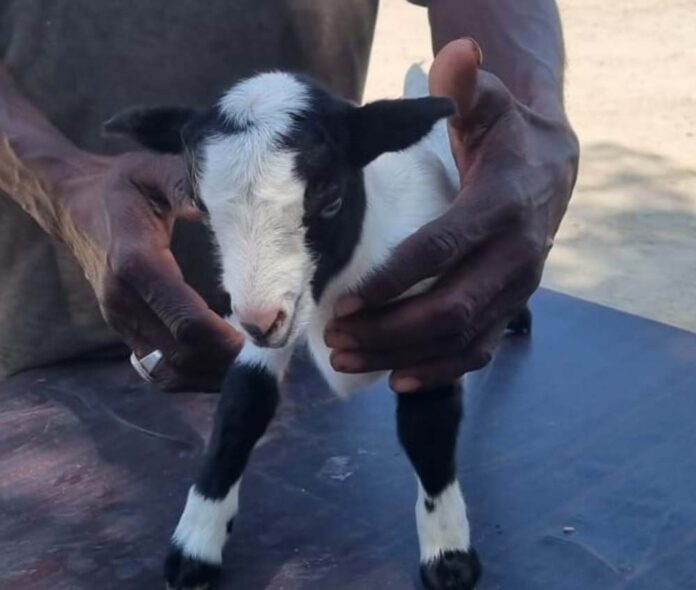Meet the newly-born baby goat named “CPEC Goat”. She is now walking, running and playing in one and only “Goat Farm” developed and run by China Overseas Ports Holding Company (COPHC) in Gwadar Free Zone at Gwadar Port. Her birth and life is a symbol of the new beginning of systemized livestock farming in Gwadar.
Previously, it was out of the question to start goat farms for goats and animals because Gwadar was just a fishing town and neither broke the ground for animal husbandry business nor developed a sense of developing goat farms throughout its history.
“CPEC Goat” now is enjoying her life with nutritious food, hygienic ambience and medical care available in the farm, said Muhammad Zubair, a chief caretaker employed by COPHC.
“CPEA Goat” is among 25 other new goat breeds housed in the farm which is located in the proximity of the 12-km-long Koh-e-Batil, he said.
“Currently we have more than 120 goats of different breeds including Makkan Chini, Gallabo, Teddi, local and Rajan puri,” he revealed. The best breed that demonstrated a high survival rate is the local one, he mentioned.
“In the farm we keep goats healthy following consistent grooming practice that includes brushing off hair and grime, washing with clean water, and so on. The goats’ shelter is clean and spacious enough for them to feel at ease. The shelter’s roofs are sufficiently ventilated in order to protect them from adverse weather conditions,” he detailed. Goat Farm is sufficient enough to raise more than 400 goats in the coming days.
Constructed in July 2019, Goat Farm is spreading over 400 square meters. With a capacity to fatten 10,000 goats, it is evolving into a learning center for newcomers in the field of livestock farming. It enjoys support of the Chinese Embassy in Pakistan and Pakistan Navy besides technical guidance of Ministry of Livestock, Balochistan and Beijing Zhongyu Biotechnology Co, Ltd.
Quetta livestock farmer Khurshid Baloch heaped praise for the development of Gwadar Goat Farm, “if local people are motivated to establish their own goat farms, the fishing town will start evolving smartly promising new avenue of livelihood as well as a tenacious step to cope with food security in Gwadar.”
“Goat farming isn’t just about producing milk or meat. It has a number of obligations and necessities to fulfill. We must take good care of livestock and manage it properly in order to meet human needs,” he added.
Gwadar people told the reporter that they used to raise animals in their houses but neither their ancestors nor they ever mulled over developing goat farm in a systematic way. Their animals often fall prey to disease, they said. “I heard about the goat farm in Gwadar and hope to see it one day to observe its functionality and benefits,” said Noor Mehtab Dashti living near Mulla Fazal Chowk in Gwadar.
It is a good development that a Joint Working Group (JWG) on Agriculture and Livestock between China and Pakistan has already been established. That JWG examines different areas to revitalize Pakistan’s agricultural and Livestock economy. If Pakistan can meet China’s quarantine regulations, there is huge scope for Pakistan’s livestock and agriculture sector to grow and open up export opportunities of millions of dollars, said Sajid Baloch, an economist working for Pakistan Livestock and Dairy Development Project. He added, “CPEC is changing the economic and poverty profile of Pakistan.”


